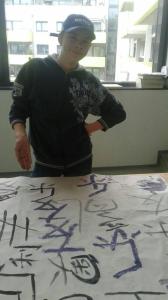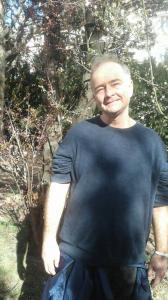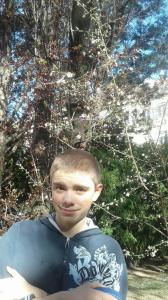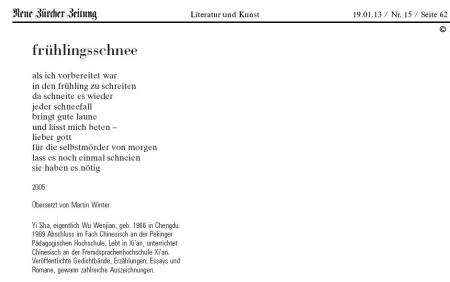11 QUESTIONS asked by Zhuang Sheng
1. Could you please introduce yourself?
Martin Winter, Chinese name 维马丁, poet and translator from Chinese into German and English.
2. Where did you spend this year’s Spring Festival?
At home in Vienna. Yi Sha 伊沙 and six other poets from China (Tu Ya 图雅, Jiang Huhai 江湖海, Xiang Lianzi 湘莲子, Pang Qiongzhen 庞琼珍, Bai Li 白立 and Chun Sue 春树) had just left, after spending over two weeks in Austria in January. You could also say we had Spring Festival together, in Innsbruck in Tyrol in the alps, with poets there, and in Vienna, also with friends. Bai Li was our best cook, and all of them made really good food, we made Jiaozi together, you know, Chinese dumplings, and many other dishes. Yi Sha likes to cook tomatoes and eggs, very simple dish, but very good. We celebrated together, and they went back one day before the lunar new year.
3. How has this virus crisis affected you?
Actually, here in Austria it has only just started to affect everyone. Schools are closed, also most shops. I have been working from home before already, so there is no big change. But I have to be afraid of both short-term and long-term effects in the publishing world, in China and in Europe.
4. How do you spend your time now?
I work from home, so the only big change is that my wife and my son are also home all day. My daughter already has her own apartment, but it is close by. She moved in February, when it was still normal. She was with us on the weekend, we are going to see her again tomorrow or so. People are supposed to stay at home, but you can go shopping for food, medicine, tobacco.
5. How is your mood these days?
Ok, maybe a little worried, but ok, not bad.
6. What are you most satisfied with from before this crisis? Can you give an impression of the efforts against the virus in your location?
My poems. My work. My family, friends, contacts, local and international. The measures against the virus here in Austria and in Vienna have only just started in earnest. There is some criticism that tourism was stopped too late in Tyrol. People who came to ski from all over Europe, and some got sick there, maybe a lot.
7. What is the best thing you have eaten during this crisis?
My wife is at home, so she cooks more. She likes to buy lamb and beef from the Muslim halal butcher at the vegetable market close by. Our vegetables are from there too. My son likes to help with cooking. Today they made lasagna, from scratch. Most food shops are open, even some restaurants for take out. Some Chinese shops have closed. Hope there are still one or two open in the city. But that’s just for spices and sauces like 老干妈.
8. What has worried your family and relations in this crisis?
My parents stay at home. My sister lives very close to them, and her sons help them. One of them is studying to be a doctor, he was working in a hospital. Hope he is ok.
9. In this global crisis, what do you think about poets writing poetry? Have you written poetry in this time?
This is a very good time for writing, reading, translating, even for distributing and discussing poetry, at least online. I have followed the situation in China. People compared the slogans warning you not to go out, some of these were very nasty and violent, to the writing on boxes sent from Japan, relief goods for Wuhan. There was Tang poetry on there, to remind people of their common heritage. Something about mountains and streams, 山川異域, 風月同天. Reminds me of Du Fu, mountains and rivers remain. So people compared this ancient culture to the crude slogans and said we should learn from the Japanese. Then one guy wrote an article in the Yangtze daily 长江日报 on February 12 and quoted Adorno who said poetry after Auschwitz was barbaric, so we don’t need poetry from Japan, because of what the Japanese did in the war. Any simple slogan was better, no poetry required, he said. But Tang poetry is very much what defines China, Chinese culture, also poetry in general. So everyone trashed this guy online. And people wrote even more poetry than before, a lot of it related to the crisis. Poems for Dr. Li Wenliang, the eye doctor from Wuhan who was one of the early whistle-blowers in late December 2019, and got reprimanded, and continued to work and died from the virus. That was world news, everyone knows this, also here in Austria. So in China on the whole there is a creative burst in this crisis, which is a very good thing, it gives hope. Some of these new poems are really very, very good. Yes, I have written a few poems myself. Some are related to China. I’ll see how it goes here in Europe. People have to stay at home, so they have more time for artistic pursuits, making music, for example. Singing from the balconies.
10. When the crisis is over, what are you most eager to do?
Don’t know yet, it has only just started here. Go out, meet people. My book is coming out in China, “Finally We Have Snow”, translated by Yi Sha. Should have come out in February. So I had planned to present the book in China this spring, at the Austrian embassy in Beijing, and at other places, maybe Xi’an etc. Anyway, my expertise is in intercultural, international contact with Chinese language, literature, poetry. So I am most eager to work in this field.
11. What do you think about the global situation?
It has brought people together. It is good for the climate, hopefully also for the social climate locally and internationally. There are always people who play us and them, but people do have a lot in common, much more than we realize. And now we have this one thing in common, globally. Everybody seems to agree on that.
庄生访谈:十一问
1.请您做一下自我介绍?
2.您在哪里过的春节?
3.此次疫情对您产生了哪些影响?
4.您每天是如何打发时间的?
5.您目前的心境如何?
6.回顾疫情之前的岁月,什么让您最满意?您可以就您所在地的疫情及防控情况谈一谈您的感受吗?
7.疫情当中,您吃过最美味的东西是什么?
8.在这次大疫当中,有什么使您的家人很不安?
9.在这次全球流行病中,您对诗人写诗怎么看?您作为诗人写诗了吗?
10.疫情过后,您最想做什么?
11.您对当下,全球疫情形势怎么看?
(请被访问者尽量简洁回答,随稿附上一张生活照和50字以内的简介,感谢!)


